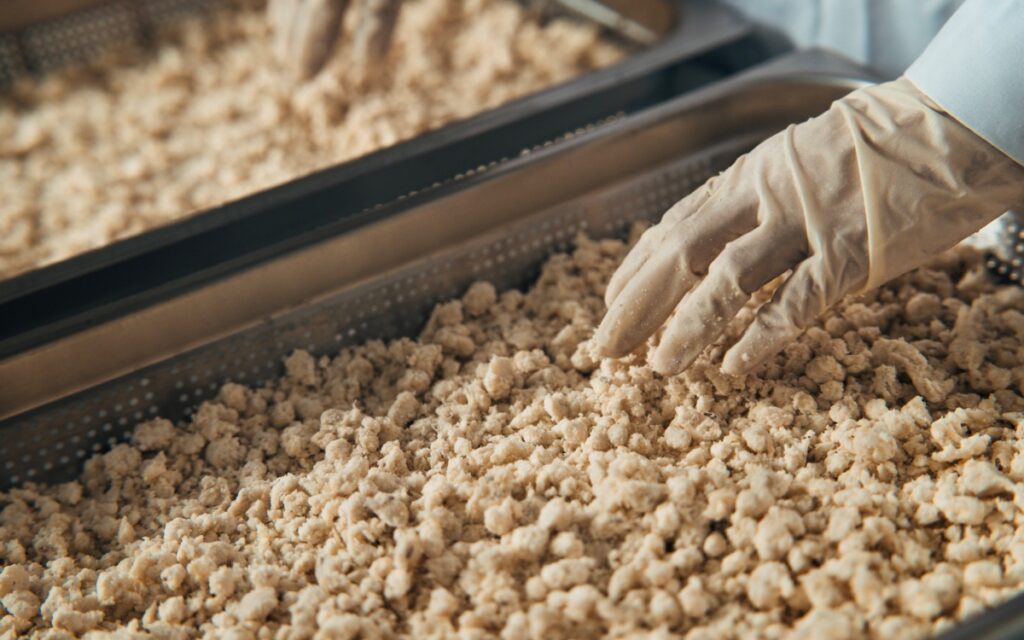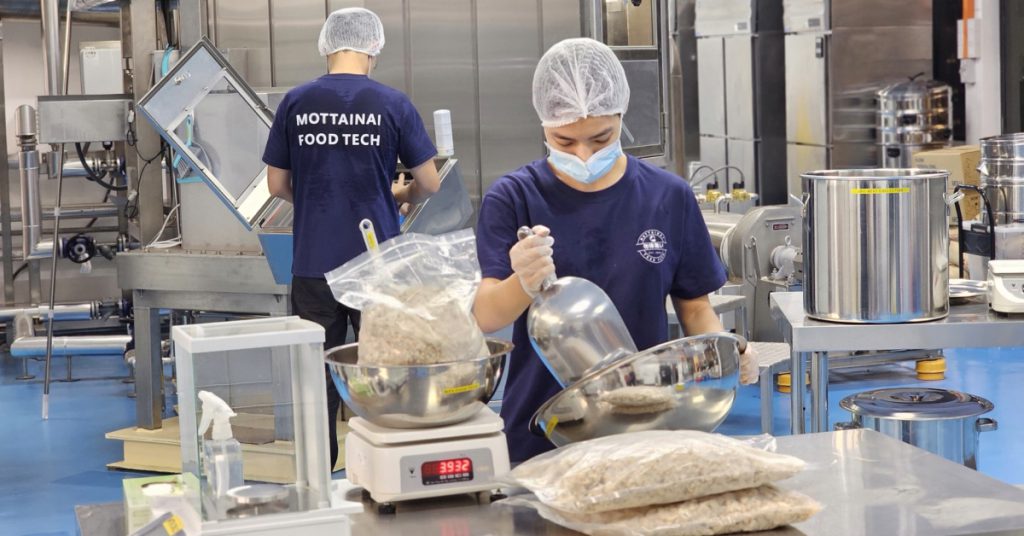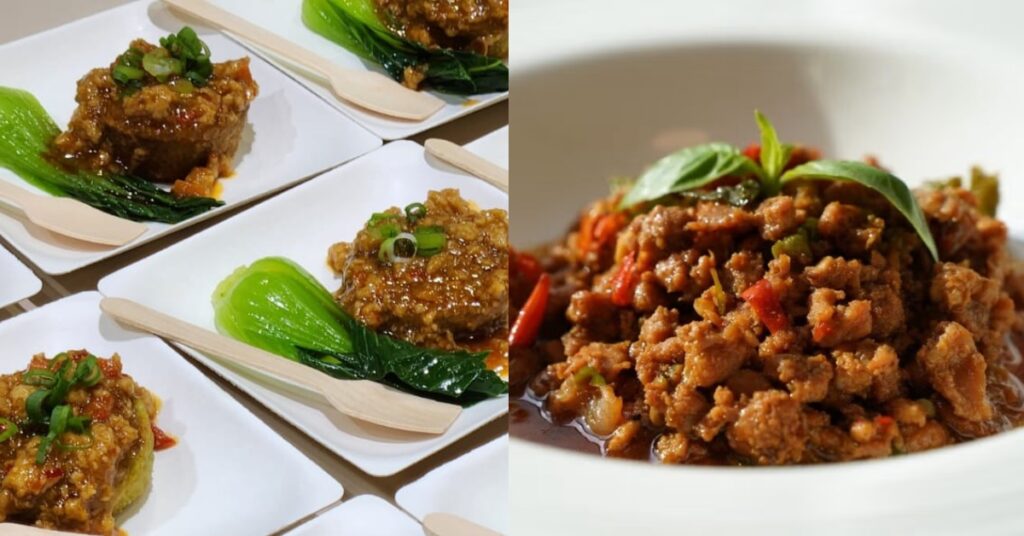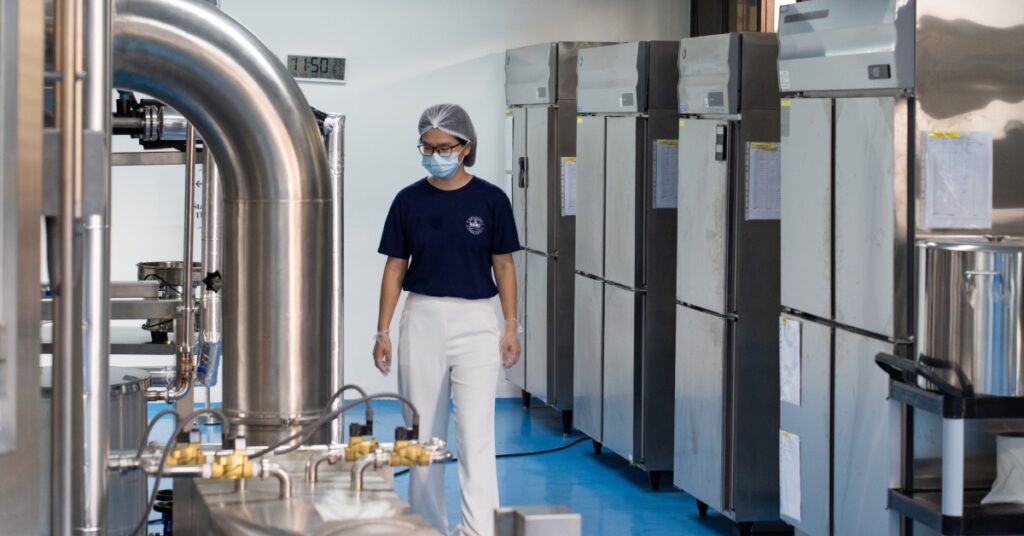Mottainai’s new product Jiro Meat is made with okara, a byproduct of soy milk production
Most of us toss out food scraps without a second thought. But for Singapore startup Mottainai Food Tech, waste is the starting point for its next food innovation.
For every 1,000 litres of soymilk produced, about 250kg of okara is generated—a nutritionally dense byproduct that usually ends up as animal feed or simply tossed. At Mottainai however, the team is turning this into Jiro Meat, a new kind of plant-protein that is produced through fermentation.
I spoke with Daryl Pek, one of the co-founders of Mottainai, to learn more about the startup’s journey and why they believe Jiro Meat can stand out in the alternative protein industry.
Overcoming scepticism
Founded in 2022, Mottainai Food Tech has spent the past three years developing its first product, Jiro Meat.
Its main component is okara. While packed with nutrients, there aren’t many ways to upcycle okara—and even when you do, it tastes bland, making flavour one of the biggest challenges.
The breakthrough came when the team discovered that fermentation could transform okara’s tasteless base form into something resembling minced chicken.

Early on, Daryl shared that the startup was often told they were walking into a tough fight, that alternative meat was a risky play, and maybe even the wrong market to enter.
That scepticism wasn’t misplaced, though. Over the years, plenty of startups have stalled or shut down, especially those working on lab-grown meat, where affordability and scale remain huge roadblocks.
Even for plant-based proteins, the grass hasn’t exactly been greener. Long ingredient lists, sometimes 40 to 50 items, have left consumers perplexed about what they’re eating, slowing mainstream adoption.
Additionally, it seems like Mottainai may have been late to enter the industry: the hype around plant-based meat peaked between 2019 and 2021, and has only continued to fade since.
Global funding for the sector fell sharply in 2022, dropping to around US$2.9 billion, a 42% decrease from the 2021 peak of US$5.1 billion, according to The Good Food Institute (GFI). Investment has continued to decline since, falling to US$1.6 billion in 2023 and US$1.1 billion in 2024.

Despite these challenges, Mottainai gained early validation in 2022 when it won the DBS Foundation × NEA Hungry for Change Challenge, a competition aimed at innovative solutions to food waste.
The award came with S$25,000 in funding, providing the fledgling startup with capital at a time when investment in alternative protein ventures was starting to dry up.
With the funding from the challenge, Mottainai built a lab in 2023 and scaled production from hundreds of grams every two days to a few kilograms.
By 2024, with additional support including a grant from Enterprise Singapore and an investment from Tai Hua Food Industries, the family business of Daryl, where he serves as a director, the startup’s total funding reached a “low seven-figure sum.”
The capital went into establishing a pilot manufacturing facility, which has since been fine-tuned and is now capable of producing 200 kilograms of Jiro Meat every two days.
Early feedback has been positive

What sets Jiro Meat apart, Daryl explained, is its simplicity and cost competitiveness.
Unlike many plant-based meats on the market that rely on a myriad of different ingredients for production, Mottainai’s product is made with fewer than three. Fermentation does the heavy lifting, producing a texture and nutritional profile that’s “naturally high” in protein and fiber, and free of cholesterol.
Cost is another key differentiator. Mottainai’s financial models show that Jiro Meat can be priced on par with chicken and pork, making it far more accessible to everyday consumers.
We’re [pricing] it as competitive as possible. If we want to price it three to four times the price of real meat, it could survive on its own for a while, but it may not be able to penetrate the market, really, on a wide scale.
Though Daryl didn’t share names, he said the startup has already begun working with food service providers and other clients, and so far, the feedback has been positive.
Beyond this, Mottainai is also exploring opportunities in the eldercare and healthcare sectors, where the product’s nutritional profile could make it a healthier alternative to traditional protein sources.

For now, the startup does not plan to sell Jiro Meat directly to consumers, as changing perceptions about plant-based meat would require too much time and money.
There’s also the challenge of preparation. Consumers may find it hard to cook Jiro Meat properly, while professional chefs are better positioned to bring out its flavour, whether through seasoning or blending it with other ingredients. With the right cooking methods, combined with Jiro Meat’s inherent flavour and texture, “the result is a product that tastes just like real meat,” according to Daryl.
That said, Mottainai isn’t producing at scale just yet. Daryl says that in the interest of quality, Mottainai is still taking its time to scale up. Nonetheless, they’re already seeing credible interest in Jiro Meat.
More capital is still needed, even as the okara comes free
While its current round of funding is enough to support operations, Daryl acknowledged that it won’t be sufficient in the long run. As demand grows, the team expects to raise more capital.

When asked if supply would be a concern as production scales, he was quick to dismiss the worry. Currently, Mottainai secures its okara completely free through a partnership with a local company, ensuring a steady pipeline for the next few years.
And even if demand outstrips that, Singapore alone produces about 10,000 tonnes of okara annually. Larger soy milk and tofu manufacturers generate tonnes of pulp every day, much of it consistent in quality thanks to ISO certifications. “Even if demand rises, the source is actually quite stable,” Daryl said.
“Even if we do go global or regional, okara is also abundant everywhere else in the world. It surges to millions of tonnes.”
Setting their sights beyond okara
To complement its core work on Jiro Meat, Mottainai also generates income by offering fermentation consulting services, helping other companies develop products from food side streams. This ties in with the startup’s broader vision: it doesn’t see itself as a plant-based brand or an alternative meat business, but as a food tech company focused on upcycling food by-products.
The team is already exploring other materials beyond okara. Oil cakes (the by-product of cold-pressing vegetable oils) and spent barley grain are some of the side streams they’re experimenting with. By partnering with other companies, Mottainai hopes to co-develop these products and scale them from lab stage all the way to market.
The journey thus far hasn’t been easy for Mottainai. Looking back, Daryl said that the startup has constantly “put out fires” throughout their journey, and that the team is still tackling challenges every day. While he didn’t want to go into detail about specific hurdles, he acknowledged that roadblocks are “part and parcel of entrepreneurship.”
Even so, Daryl remains confident that the startup will succeed. With a growing roster of partners, and multiple products in the pipeline, he believes Mottainai is well-positioned to scale its technology and continue turning food waste into sustainable protein products.
- Find out more about Mottainai Food Tech here.
- Read other articles we’ve written on Singaporean businesses here.
Also Read: Here’s 7 takes on edible insects in S’pore, from cricket protein bars to mealworm margaritas
Featured Image Credit: Mottainai Food Tech/ Rachel Ong via Facebook
